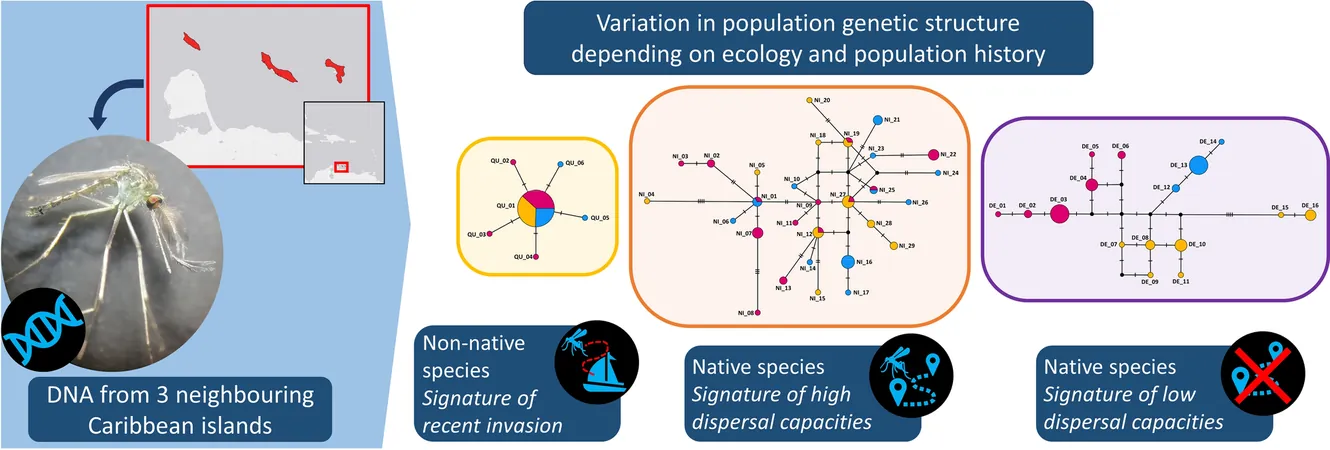
Unlocking the Secrets of Mosquito Genetics on Caribbean Islands
2025-05-09
Author: Sarah
A Deep Dive into Mosquito Diversity
Did you know that around 3,700 species of mosquitoes buzz around the globe? While many are notorious for their role in spreading diseases, the majority of these species remain understudied. This leaves a significant gap in our understanding of their population dynamics and genetic variations, especially when it comes to ecological factors affecting their genetics.
The Importance of Ecological and Historical Contexts
Research has shown that the ecological environment and historical events significantly shape genetic populations of mosquitoes. Non-native species like Culex quinquefasciatus and Aedes aegypti exhibit noticeable differences in genetic diversity compared to local species. Interestingly, it appears that introduced species often have less genetic diversity as a result of their shorter population history on new terrain. This reduced genetic variability raises questions about their evolutionary adaptability.
Islands as Natural Laboratories
Islands serve as fantastic natural laboratories for studying mosquito genetics due to their isolated nature. The Dutch Leeward Antilles—consisting of Aruba, Curaçao, and Bonaire—provide a phenomenal setting. The islands are rich with diverse habitats, presenting various ecological niches for both native and introduced mosquito species. This unique setting helps scientists explore how genetic diversity is influenced by both ecological factors and historical contexts.
The Study—What Was Done?
During the ‘Expedition ABC Mug-Sangura 2022,’ scientists collected mosquito samples for genetic analysis across these islands. The researchers aimed to analyze six representative mosquito species, covering around 60% of the local mosquito diversity. They utilized mitochondrial COII gene sequences to understand the genetic intricacies among these populations.
Findings: A Genetic Landscape Revealed
The research uncovered three main patterns in mosquito genetic diversity. Non-native species like Aedes aegypti and Culex quinquefasciatus displayed lower genetic diversity, indicating a limited adaptability to their environments. In stark contrast, native mosquitoes like Cx. nigripalpus and Ae. taeniorhynchus exhibited richer genetic diversity, suggesting that their ecological niches significantly influence their genetic make-up.
Conclusions: Patterns that Matter
The study concluded that ecological strategies and historical events profoundly impact the genetic structures of mosquito populations. This highlights a crucial divide between native and non-native species, particularly in ecologically rich systems like the Dutch Leeward Antilles. The research opens doors for better population management and disease control strategies, emphasizing the need for a broader understanding of mosquito genetics in diverse ecosystems.
Implications for Future Research
Understanding the genetic landscape of mosquitoes not only aids in managing local populations but also contributes to broader discussions about habitat fragmentation and ecological adaptations. This research sets the stage for future comparative studies on mosquito genetics, bridging the gap between ecological theory and practical conservation strategies.


 Brasil (PT)
Brasil (PT)
 Canada (EN)
Canada (EN)
 Chile (ES)
Chile (ES)
 Česko (CS)
Česko (CS)
 대한민국 (KO)
대한민국 (KO)
 España (ES)
España (ES)
 France (FR)
France (FR)
 Hong Kong (EN)
Hong Kong (EN)
 Italia (IT)
Italia (IT)
 日本 (JA)
日本 (JA)
 Magyarország (HU)
Magyarország (HU)
 Norge (NO)
Norge (NO)
 Polska (PL)
Polska (PL)
 Schweiz (DE)
Schweiz (DE)
 Singapore (EN)
Singapore (EN)
 Sverige (SV)
Sverige (SV)
 Suomi (FI)
Suomi (FI)
 Türkiye (TR)
Türkiye (TR)
 الإمارات العربية المتحدة (AR)
الإمارات العربية المتحدة (AR)